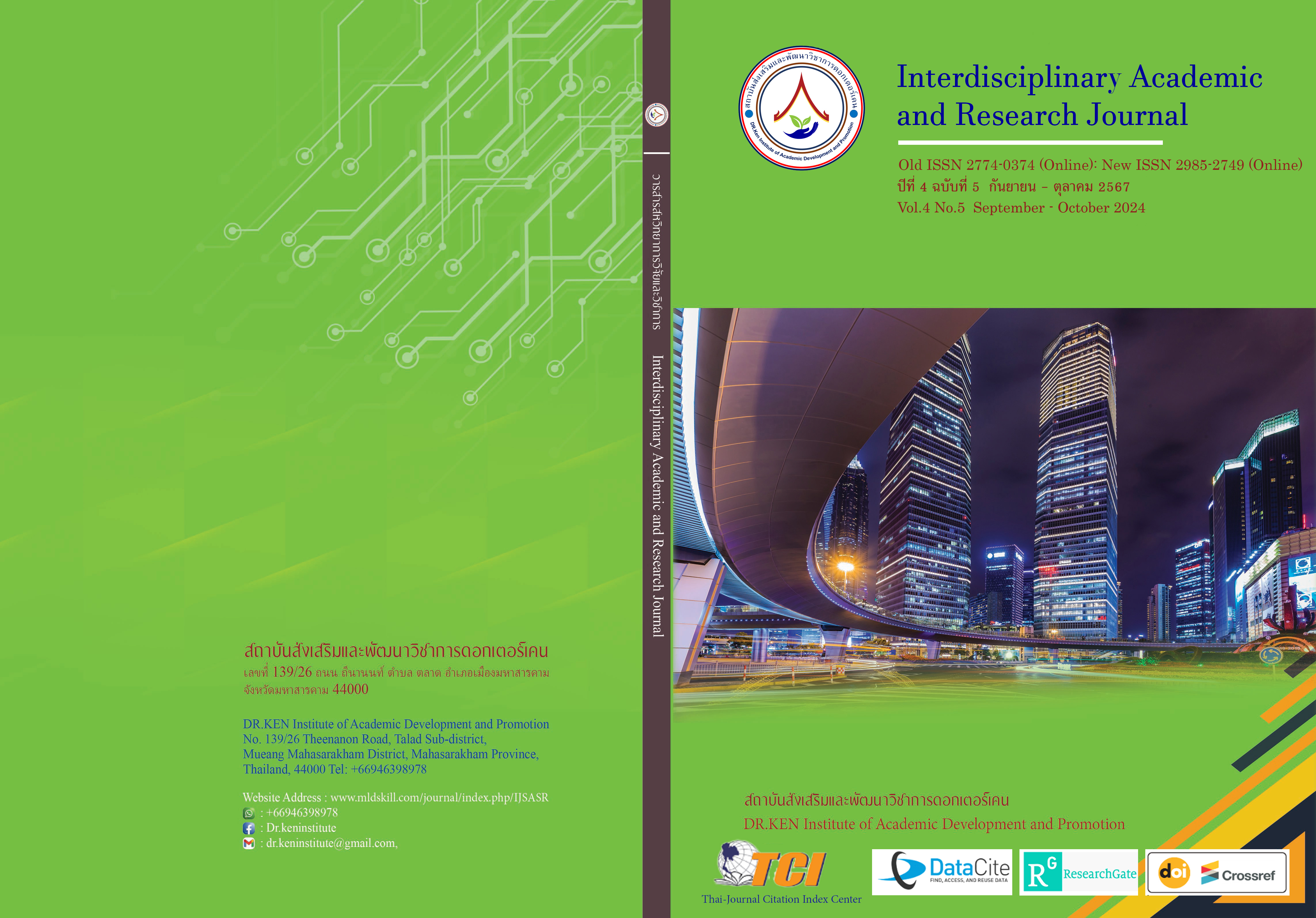Academic Leadership of Educational Institution Administrators under the Jurisdiction of Udon Thani Primary Educational Service Office Area 2
DOI:
https://doi.org/10.60027/iarj.2024.276976Keywords:
Leadership; , Academic Leadership; , Educational institution administrationAbstract
Background and Aims: Education plays a critical role in developing individuals, society, and the nation, serving as a driving force for sustainable national development and fostering harmonious living within communities. Administrators of educational institutions hold a key position in ensuring that education adapts to evolving economic, social, and technological landscapes. To meet these challenges, leaders must be skilled in managing change and enhancing academic quality. This research aims to: 1) examine the academic leadership level of school administrators under Udon Thani Primary Educational Service Office Area 2, 2) compare their leadership based on position, experience, and school size, and 3) explore strategies for developing their academic leadership.
Methodology: The research sample consisted of 310 school administrators and teachers, selected based on Krejci and Morgan's table and randomly divided into groups. A 5-level rating scale questionnaire was used as the research instrument, with a consistency index ranging from 0.80 to 1.00 and an overall reliability score of 0.86. Statistical methods applied in the data analysis included frequency, percentage, mean, standard deviation, t-test, and F-test to evaluate and compare the findings.
Results: The research findings are as follows: (1) The academic leadership of educational institution administrators under Udon Thani Primary Educational Service Office Area 2, both overall and in each specific area, is at a high level. (2) A comparison of opinions on academic leadership, classified by position, work experience, and school size, revealed no significant differences across these factors. (3) Guidelines for promoting academic leadership among school administrators include eight key areas: 1) raising awareness in meetings and setting high expectations for student academic achievement, 2) showing enthusiasm for implementing school improvement strategies, 3) providing incentives and rewards for academic efforts, 4) tracking academic progress, 5) creatively utilizing resources and personnel, 6) ensuring the school environment is pleasant, orderly, and safe, 7) monitoring teachers' instructional practices, and 8) observing teaching and giving constructive feedback.
Conclusion: Overall, the study reveals that school administrators in Udon Thani Primary Educational Service Office Area 2 exhibit strong perceptions of academic leadership, which are consistent regardless of their position, experience, or the size of their institutions. To further enhance leadership effectiveness, the suggested guidelines emphasize the importance of fostering a supportive environment, implementing practical strategies for school improvement, and closely monitoring both students' academic progress and teaching practices. These measures are designed to ensure that academic leadership continues to positively impact educational outcomes.
References
กรรณิการ์ วีระวงค์. (2564). การศึกษาภาวะผู้นำทางวิชาการของผู้บริหารสถานศึกษา สังกัดสำนักงานเขตพื้นที่การศึกษาประถมศึกษาเชียงราย เขต 3. การศึกษาค้นคว้าด้วยตนเอง. มหาวิทยาลัยพะเยา.
เกตุสุดา กิ้งการจร. (2560). ภาวะผู้นำทางวิชาการของผู้บริหารสถานศึกษา สังกัดสำนักงานเขตพื้นที่การศึกษามัธยมศึกษา เขต 4. วิทยานิพนธ์. มหาวิทยาลัยเทคโนโลยีราชมงคลธัญบุรี.
จุฑาทิพย์ ชัยบัณฑิต. (2560). ความสัมพันธ์ระหว่างภาวะผู้นาทางวิชาการของผู้บริหาร สถานศึกษากับความเป็นองค์กรแห่งการเรียนรู้ของโรงเรียนมัธยมศึกษา สังกัดสำนักงานเขตพื้นที่การศึกษามัธยมศึกษาเขต 16. วิทยานิพนธ์, มหาวิทยาลัยหาดใหญ่
ชลนิชา ศิลาพงษ์. (2564). ภาวะผู้นำทางวิชาการของผู้บริหารสถานศึกษาที่ส่งผลต่อประสิทธิผลการบริหารงานวิชาการในโรงเรียน สังกัดสำนักงานเขตพื้นที่การศึกษาประถมศึกษาสกลนคร เขต 1. วิทยานิพนธ์ ปริญญาครุศาสตรมหาบัณฑิต สาขาวิชาการบริหารการศึกษา, มหาวิทยาลัยราชภัฏสกลนคร.
ซัมซียะห์ เมาลิดิน. (2564). ภาวะผู้นำทางวิชาการของผู้บริหารสถานศึกษา ตามความคิดเห็นของครูสังกัดสำนักงานเขตพื้นที่การศึกษาประถมศึกษานราธิวาส เขต 1. สารนิพนธ์, มหาวิทยาลัยหาดใหญ่.
ฐิตาพร ตันเจริญรัตน์. (2563). ภาวะผู้นำทางวิชาการของผู้บริหารกับทักษะของครูในศตวรรษที่ 21 ในสถานศึกษาสังกัดสำนักงานเขตพื้นที่การศึกษามัธยมศึกษา เขต 8. วิทยานิพนธ์. มหาวิทยาลัยศิลปากร.
ธนิต รัตนศักดิ์ดา และคณะ. (2565). ภาวะผู้นำทางวิชาการของผู้บริหารสถานศึกษาสังกัดสำนักงานเขตพื้นที่การศึกษาประถมศึกษาปราจีนบุรี เขต 2. วารสารบริหารการศึกษา มศว, 19(36), 80-90.
บุญชม ศรีสะอาด. (2556). การวิจัยเบื้องต้น. พิมพ์ครั้งที่ 9. กรุงเทพฯ : สุวรียาสาส์น.
ปวีณา บุทธิจักร. (2564). ภาวะผู้นำทางวิชาการของผู้บริหารสถานศึกษาที่ส่งผลต่อประสิทธิผลการบริหารงานวิชาการของโรงเรียน สังกัดสำนักงานเขตพื้นที่การศึกษามัธยมศึกษา เขต 21. วิทยานิพนธ์, มหาวิทยาลัยราชภัฏสกลนคร.
สรรเพชญ ไตรยงค์. (2564). ภาวะผู้นำทางวิชาการของผู้บริหารสถานศึกษาที่ส่งผลต่อประสิทธิผลการบริหารงานวิชาการ สังกัดสำนักงานเขตพื้นที่การศึกษาประถมศึกษาบึงกาฬ. ปริญญาครุศาสตรมหาบัณฑิต สาขาวิชาการบริหารการศึกษา, มหาวิทยาลัยราชภัฏสกลนคร.
สำนักงานเลขาธิการสภาการศึกษา. (2560). แผนการศึกษาแห่งชาติ พ.ศ. 2560-2579. กรุงเทพฯ: พริกหวานกราฟฟิค.
อริสรา จันทรมงคลชัย และสมคิด สกุลสถาปัตย์. (2566). ภาวะผู้นำทางวิชาการของผู้บริหารกับการเป็นชุมชนแห่งการเรียนรู้ทางวิชาชีพของสถานศึกษาในสหวิทยาเขตเมืองสมุทรสังกัดสำนักงานเขตพื้นที่การศึกษามัธยมศึกษาสมุทรสาครสมุทรสงคราม. วารสารนิสิตวัง, 25(2), 43-53.
Davis, G.A., & Thomas, M.A. (1989). Effective Schools and Effective Teachers. Boston: Allyn and Bacon.
DeBevoise, W. (1984). Synthesis of Research on the Principal as Instructional Leader. Educational Leadership, 41(5), 14-20.
Krejcie, R. V., & Morgan, D. W. (1970). Determining sample size for research activities. Educational and Psychological Measurement, 30(3), 607–610. DOI: https://doi.org/10.1177/001316447003000308
Downloads
Published
How to Cite
Issue
Section
License
Copyright (c) 2024 Interdisciplinary Academic and Research Journal

This work is licensed under a Creative Commons Attribution-NonCommercial-NoDerivatives 4.0 International License.
Copyright on any article in the Interdisciplinary Academic and Research Journal is retained by the author(s) under the under the Creative Commons Attribution-NonCommercial-NoDerivatives 4.0 International License. Permission to use text, content, images, etc. of publication. Any user to read, download, copy, distribute, print, search, or link to the full texts of articles, crawl them for indexing, pass them as data to software, or use them for any other lawful purpose. But do not use it for commercial use or with the intent to benefit any business.
















.png)


